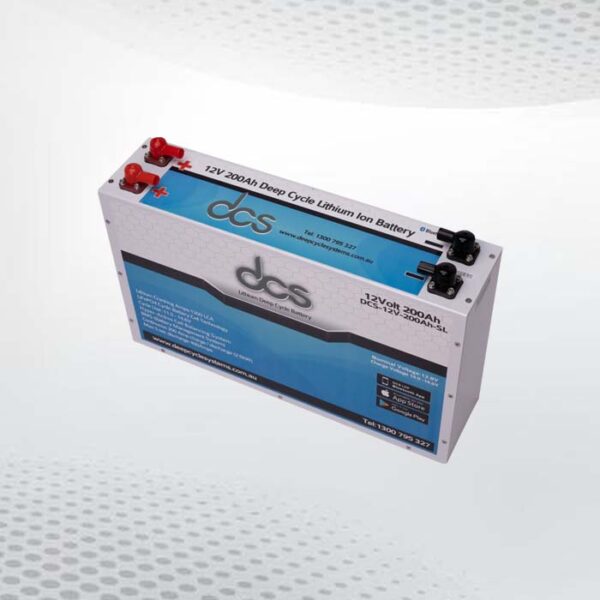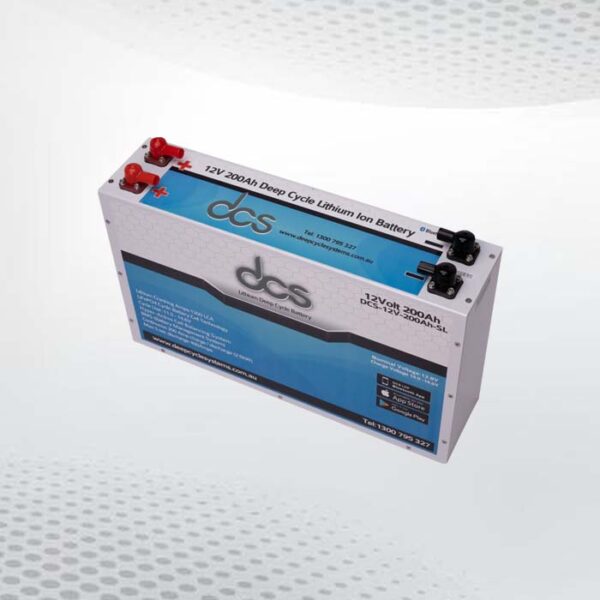When it comes to choosing the right battery for your energy storage needs, the options can seem overwhelming. Two popular choices in the market are Li Ion and Lithium Ion batteries, especially those with a capacity of 200ah. In this expert analysis, we will dive into the key differences between these two types of batteries and explore the manufacturing secrets behind the Best 200ah Lithium Battery.
Understanding the Basics of Lithium Ion Batteries
At the core of many modern electronic devices and electric vehicles lies the lithium ion battery, a type of rechargeable power source that operates by moving lithium ions from the negative electrode to the positive electrode during discharge, and back when charging. The movement of these ions occurs in a liquid electrolyte. A separator between the electrodes prevents short-circuiting while allowing the ions to flow freely.
This technology stands out for its high energy density, which refers to the amount of energy a battery can store relative to its weight. This characteristic, coupled with a notable ability to maintain a stable voltage output until fully discharged, makes lithium ion batteries highly efficient. Another significant advantage is their low self-discharge rate, meaning they lose their charge much slower when not in use compared to other rechargeable batteries.
This feature, alongside a long lifespan characterized by a large number of charge/discharge cycles before performance degradation, underscores the appeal of lithium ion batteries across various applications. They require minimal maintenance, unlike other battery technologies that necessitate regular cycling to maintain their battery life. This ease of use, combined with their performance metrics, underscores the revolutionary role of lithium ion batteries in powering today’s energy needs and tomorrow’s innovations.
The Significance of Li Ion Battery 200ah
The capacity of a Li Ion Battery 200ah measured in ampere-hours (ah), is a critical indicator of its energy storage capability. For lithium ion batteries, having a 200ah rating signifies a high-capacity energy reserve, which is paramount for applications demanding prolonged power availability. This robust capacity allows these batteries to serve as the backbone for systems where energy reliability and endurance are non-negotiable.
In off-grid solar setups, for example, a 200ah lithium ion battery can store ample solar energy during the day to power essential devices through the night, reducing dependence on the grid or generators. In the realm of marine applications, the 200ah capacity ensures that navigational and safety equipment, as well as onboard comforts, remain operational during extended voyages. Similarly, for backup power systems, the substantial energy reserve of a 200ah lithium ion battery guarantees a reliable power supply during outages, securing uninterrupted operation of critical appliances and systems.
This capacity not only meets the immediate power demands but also accommodates future expansions or increased energy requirements. The adaptability and resilience offered by 200ah lithium ion batteries underscore their significance in supporting a wide array of power-intensive applications, ensuring they remain a go-to solution for managing sophisticated energy storage needs efficiently.
Key Manufacturing Secrets behind the Best 200ah Lithium Ion Batteries
Crafting top-tier 200ah lithium ion batteries involves a blend of science, precision, and innovation. High-quality materials are at the forefront of this process. Manufacturers opt for premium-grade lithium, high-purity electrolytes, and advanced electrode materials to ensure superior performance and longevity. Precision in the electrode coating process is critical; even thickness and consistent application improve battery efficiency and capacity. Advanced manufacturing techniques, such as dry-electrode coating and laser cutting, are employed to enhance the structural integrity of the battery, leading to improved safety and reliability.
Another cornerstone is the meticulous design and implementation of the battery’s architecture. The arrangement of cells within the battery must optimize energy density while ensuring adequate heat dissipation. This careful planning minimizes the risk of overheating and contributes to the battery’s overall safety profile.
Stringent quality control measures are non-negotiable. Each battery undergoes rigorous testing to validate its performance under various conditions. This includes stress tests to evaluate resilience to overcharging, deep discharging, and exposure to extreme temperatures.
Attention to detail extends to the integration of advanced Battery Management Systems (BMS). These systems are tailored to precisely monitor and regulate the battery’s operation, safeguarding against potential issues and optimizing lifespan.
In sum, the secret lies in combining high-quality materials, precise manufacturing techniques, and rigorous testing protocols, underscored by cutting-edge technology in battery management. These components collectively define the excellence of the best 200ah lithium ion batteries on the market.
The Role of Battery Management Systems (BMS) in Enhancing Performance
A Battery Management System (BMS) is integral to maximizing the efficiency and safety of 200ah lithium ion batteries. This sophisticated technology serves as the brain of the battery pack, continuously monitoring its state to ensure optimal performance. A BMS tracks the voltage and current of each cell within the battery, providing crucial insights into the battery’s overall health and operational status. This vigilance allows for the prevention of overcharging and deep discharging, conditions that could potentially harm the battery and reduce its lifespan.
Additionally, a well-designed BMS manages the temperature of the battery pack by orchestrating the thermal management system to activate cooling mechanisms when needed. This is particularly important for 200ah lithium ion batteries used in high-demand applications, where excessive heat could lead to diminished efficiency or even pose safety risks.
The BMS also plays a pivotal role in balancing the charge across the battery’s cells. Over time, individual cells within a battery pack may experience slight variations in charge levels, which could lead to imbalances. By ensuring that all cells charge and discharge at an equal rate, the BMS helps maintain the battery’s overall health and prolongs its service life.
 Importantly, the BMS facilitates safer charging practices by communicating with the charging system to adjust charging rates as necessary, thereby protecting the battery from potential hazards. This advanced level of monitoring and control underscores the BMS’s critical contribution to enhancing the performance and durability of 200ah lithium ion batteries, making it an essential component in the quest for reliable, high-capacity energy storage solutions.
Importantly, the BMS facilitates safer charging practices by communicating with the charging system to adjust charging rates as necessary, thereby protecting the battery from potential hazards. This advanced level of monitoring and control underscores the BMS’s critical contribution to enhancing the performance and durability of 200ah lithium ion batteries, making it an essential component in the quest for reliable, high-capacity energy storage solutions.
Applications That Benefit Most from Lithium Ion Battery 200ah
The versatility and robust capacity of Lithium Ion Battery 200ah make them an optimal choice for a myriad of applications where high-energy storage and reliability are paramount. One of the most impactful uses is in off-grid solar systems, where these batteries store solar energy harvested during the day to power homes and facilities seamlessly through the night, ensuring energy autonomy and resilience.
Electric vehicles (EVs) also significantly benefit from the substantial energy reserve of 200ah batteries, as they require dense energy storage solutions that can support extended range and efficiency, reducing the frequency of recharges for users. In addition, these batteries are instrumental in large-scale energy storage systems (ESS), which play a critical role in stabilizing the grid and harnessing renewable energy sources, thus facilitating a smoother transition towards sustainable energy practices.
Furthermore, 200ah lithium ion batteries are a cornerstone of reliable backup power solutions for residential and commercial establishments. They ensure the continuous operation of essential devices and systems during power outages, safeguarding against potential losses and inconvenience.
Navigating the Challenges of Using 200ah Lithium Ion Batteries
Utilizing 200ah lithium ion batteries, while advantageous for a multitude of energy storage applications, presents unique challenges that users must adeptly manage. One critical issue is sensitivity to environmental conditions, such as extreme temperatures. Exposure to excessive heat can lead to decreased battery efficiency and lifespan, while cold temperatures can significantly reduce the battery’s capacity to hold a charge. Users must ensure that these batteries are operated within their specified temperature ranges to maintain optimal performance.
Another challenge lies in the risk of overcharging, which can not only impair battery life but also pose safety risks. Implementing a reliable Battery Management System (BMS) is essential to monitor and control the charging process, preventing overcharge conditions that could lead to thermal runaway—a condition where the battery becomes excessively hot and can potentially cause fire or explosion.
Proper maintenance and handling are paramount to mitigating these risks. Users should adhere to manufacturer guidelines for storage, charging, and usage to ensure the safety and longevity of their 200ah lithium ion batteries. It’s also important to conduct regular inspections for any signs of damage or wear that could impact battery performance.
Future Trends in Lithium Ion Battery Technology
Emerging advancements in lithium ion battery technology promise to redefine energy storage capacities and efficiencies. Research is actively focused on exploring alternative materials that can offer higher energy densities and safer battery compositions. Solid-state batteries, distinguished by their use of a solid electrolyte instead of a liquid, are at the forefront of this innovation. These batteries are expected to significantly reduce the risk of leakage and thermal runaway, enhancing both safety and performance.
Nanotechnology is another area under investigation, aiming to increase the surface area of electrodes and, in turn, the capacity and speed of charging. Additionally, efforts are being made to improve the sustainability of lithium ion batteries through the development of more eco-friendly materials and recycling processes.
These technologies not only aim to extend the lifespan and reduce the environmental impact of batteries but also to decrease reliance on rare and expensive materials, potentially lowering costs and further expanding the application of lithium ion batteries in various sectors.
FAQs
Q: Are Li Ion and Lithium Ion batteries the same?
A: Although frequently used interchangeably, there’s a subtle distinction. Li Ion refers to a specific subgroup within the broader category of lithium ion batteries, characterized by their particular chemical composition and performance characteristics.
Q: What is the typical lifespan of a 200ah lithium ion battery?
A: The longevity of a 200ah lithium ion battery is influenced by several factors including its usage patterns, frequency of charging cycles, and adherence to maintenance protocols. Generally, with proper care, these batteries are expected to serve effectively for between 5 to 10 years.
Q: Can 200ah lithium ion batteries be recycled?
A: Absolutely, recycling is possible and encouraged for 200ah lithium ion batteries. This process allows for the recovery and reuse of valuable materials such as lithium, cobalt, and nickel, aiding in the conservation of resources and reduction of the environmental footprint associated with battery production.
Q: How does temperature affect the performance of 200ah lithium ion batteries?
A: Extreme temperatures, either too high or too low, can significantly impact the performance and health of 200ah lithium ion batteries. High temperatures may decrease efficiency and lifespan, whereas low temperatures can reduce the battery’s ability to hold a charge. It’s crucial to operate and store these batteries within their recommended temperature ranges.
Conclusion
To summarize, the journey into the world of 200ah lithium ion batteries reveals their critical role in modern energy storage and application across various sectors. The analysis presented emphasizes not only the unique characteristics and advantages of these high-capacity batteries but also the intricacies involved in their manufacturing and the ongoing advancements in battery technology. It’s clear that selecting a 200ah lithium ion battery involves considering factors beyond mere capacity, including safety features, longevity, and the presence of a robust Battery Management System.
| Related Business Listings |
| Contact Directory |
| Local Business Profiles |

